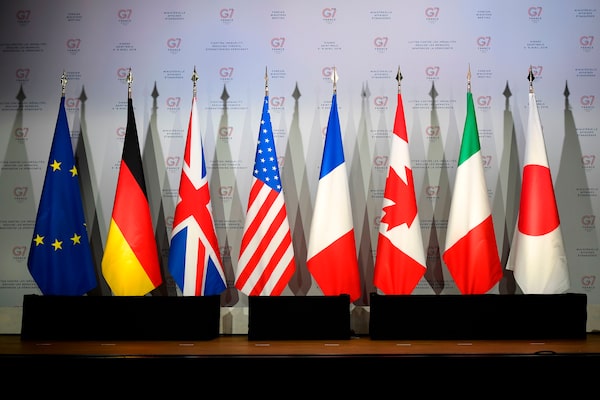
Flags of European Union, Germany, United-Kingdome, the United States of America, France, Canada, Italy and Japan during a meeting to prepare the G7 Summit in Biarritz on April 5, 2019.DAMIEN MEYER/AFP/Getty Images
Calvin Goldman, K.C., is a former head of the Competition Bureau and practises law in Toronto. Thomas Mathews, of the Bars of Ontario and Quebec, practises law in Toronto.
In response to concerns about Canadian productivity, businesspeople, economists and consumers have called for greater competition in major sectors such as telecommunications and airlines. However, the national-security sensitivity of these sectors also needs to be considered – namely the geopolitical rivalry between the United States and China and threats to the West from autocratic countries.
Canada should open up its overly protected and regulated telecom and airline sectors to foreign competition from its Five Eyes intelligence allies (the U.S., Britain, Australia and New Zealand) and other trusted countries. This would provide substantial competitive choice and pricing for consumers while protecting against foreign adversaries.
Currently, foreign ownership in the telecom sector is severely restricted by outdated rules within the Telecommunications Act. A Canadian telecom entity that represents more than 10 per cent of the sector must be Canadian-owned, where at least 80 per cent of the board and 80 per cent of the voting shares are Canadian. The restriction disincentivizes even U.S.-based telecom competitors (such as AT&T and Verizon) from entering Canada on any sufficient scale. Similarly, significant limitations apply to airline cabotage under the provisions of the Canada Transportation Act, restricting the ability of foreign airlines to operate routes within the country.
Without foreign competition, telecom and airline incumbents consistently fail to offer sufficient choice and competitive pricing, while innovation and long-term growth potential in such essential infrastructure are undermined. Canadians ultimately suffer, paying among the highest prices in the world for cellphone service, data per gigabyte and airfare.
Since Canada already shares its national-security intelligence with the Five Eyes, these allies provide a safe starting point for acceptable foreign entry in the highly sensitive telecom industry. There is an obvious need to protect our telecom networks, data, sensitive information, telecom supplier diversity, and trade and innovation secrets from hostile foreign interests. The Five Eyes, led by the substantial security apparatus of the U.S. and Britain, would provide confidence to Canadians that their telecom sector is safe.
Interestingly, Japan was included in the Global Coalition on Telecommunications, partnering with the U.S., Britain, Australia and Canada to foster diverse supply chains, secure and interoperable standards, and innovation in the telecom sector. The inclusion of Japan may suggest that Canada could also consider allowing other allies to enter its sector, or at least the less sensitive parts.
The airline industry, in contrast, should allow for wider foreign competition. There is no reason why airlines with strong safety records from friendly countries, such as Germany, France and the Netherlands, should be prevented from operating on Canadian domestic routes. Before investing billions in high-speed rail, Canada should ensure domestic air travel is as competitive as possible.
While the above arguments make economic sense, domestic politics cannot be ignored, as such legislative changes would be heavily contested by incumbent Canadian firms and their powerful lobbies. Maxime Bernier, for example, learned how effectively the Canadian dairy industry organized itself in opposition to his 2017 Conservative leadership bid and campaign to end supply chain management. Any major-party leadership candidate can expect a similar response should their platform include calls for increased foreign competition in telecom or airlines.
Nonetheless, there is real merit at this time in a political leader standing up for Canadian consumers and small businesses in the telecom and airline sectors. In addition, such a policy could be enacted by a politician once in power or receive cross-party support in future minority Parliaments.
Canadian economic competitiveness and prosperity are at risk. The anti-competitive effects of sectoral regulation in telecom and airlines cannot continue to be ignored by a country forced to address its long-standing productivity shortcomings and bleak growth prospects. There is a path to safely open sensitive sectors to foreign competition for the net benefit of Canadians, while guarding national security.
As domestic incumbents have continually failed to provide sufficient competition, Canada should now significantly enhance its competitive markets by opening the doors to investment from businesses based in trusted allies.